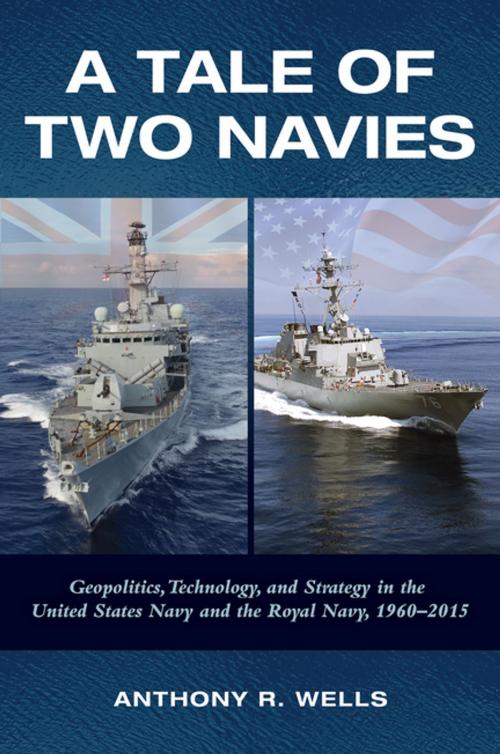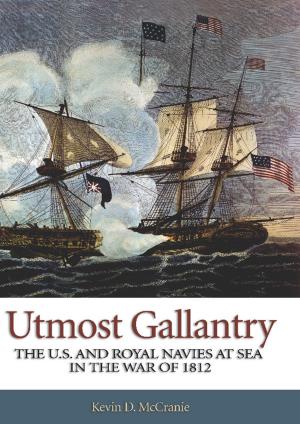A Tale Of Two Navies
Geopolitics, Technology, and Strategy in the United States Navy and the Royal Navy, 1960-2015
Nonfiction, History, Military, Strategy| Author: | Anthony Wells | ISBN: | 9781682471210 |
| Publisher: | Naval Institute Press | Publication: | February 20, 2017 |
| Imprint: | Naval Institute Press | Language: | English |
| Author: | Anthony Wells |
| ISBN: | 9781682471210 |
| Publisher: | Naval Institute Press |
| Publication: | February 20, 2017 |
| Imprint: | Naval Institute Press |
| Language: | English |
This book describes and analyses in hitherto unexplored ways the unique relationship of the United States Navy and the Royal Navy as exemplars of the US-UK Special Relationship” in the context of strategy, operations, technology, and intelligence. A continuous thread of 55 years of maritime strategic planning and execution is examined within the challenges and changes of a dynamic period in which the shared national self-interests and inherent values of the United States and the United Kingdom were exemplified by the United States and Royal Navies. This book is a discursive analysis of selective key themes rather than a definitive history - a discourse between the author and readers, with lessons learned - and letting the past not be prologue, rather to anticipate change and formulate future endeavors based on a didactic interchange between the past, the present, and the foreseeable future, that now witnesses the growth of Chinese naval power and the re-emergence of a Russian Navy, and other pressing serious international challenges.
Political will and funding for a maritime strategy are examined in the light of past, current, and emerging threats, while not replicating in any shape or form what is easily available elsewhere. This book contributes and stimulates in the non-quantifiable domains that relate to the question why, and those themes where the author has unique knowledge and insight that offers sound guidance in hitherto unexamined and highly relevant areas that have seen little or no light, from the high level institutional and organizational aspects of political-military decision making down to the effects of hugely significant technical changes that in due course impact policy making and operations. The readers are presented with questions as this study unfolds for example - how should we best exploit emerging technologies for the strategic and tactical benefit of both navies and that fit optimally the national security needs of the US and UK?
This book is about naval thinking its impact at every level of naval activity and interaction with national defense in its many complexities - providing a framework for thinking through where both navies need to go in the future and why, and perhaps most of all how to steer a successful course through what is often a minefield of opponents, who do not always grasp the basics of maritime strategy. The book provides thought provoking guidance and stimulation a thoughtful dialogue with each reader to individually and collectively contribute to the debate and actions that need to be taken in order to keep both countries naval strategies deeply rooted and focused on well-reasoned fact, intellectual integrity, and rigor. This book aims to provide a bedrock experience that can help shape the future.
This book is singular in its field - with new material, insights, and analysis - presented in a dialogue format to challenge the reader to think and consider - not tell - to relate the facts, analyze, and draw conclusions. However, the abiding conclusion of this book is the critical and enduring need for a US-UK joint maritime strategy now and for the future, and how this may evolve. The unique presentation of US-UK naval strategy, plans, policies, program, operations, and intelligence over the 55 year period presents the reader with new approaches and angles, particularly regarding the Special Intelligence relationship, that the two navies represent. The book exemplifies and challenges thought regarding the crown jewels of naval strategy - without hyperbole the book takes the thinking of past writers to a new level of not just information, but conceptual thinking that ensures the future need for, and dominance, of naval strategy.
Political will and funding for a maritime strategy are examined in the light of past, current, and emerging threats, while not replicating in any shape or form what is easily available elsewhere. This book contributes and stimulates in the non-quantifiable domains that relate to the question why, and those themes where the author has unique knowledge and insight that offers sound guidance in hitherto unexamined and highly relevant areas that have seen little or no light, from the high level institutional and organizational aspects of political-military decision making down to the effects of hugely significant technical changes that in due course impact policy making and operations. The readers are presented with questions as this study unfolds for example - how should we best exploit emerging technologies for the strategic and tactical benefit of both navies and that fit optimally the national security needs of the US and UK?
This book is about naval thinking its impact at every level of naval activity and interaction with national defense in its many complexities - providing a framework for thinking through where both navies need to go in the future and why, and perhaps most of all how to steer a successful course through what is often a minefield of opponents, who do not always grasp the basics of maritime strategy. The book provides thought provoking guidance and stimulation a thoughtful dialogue with each reader to individually and collectively contribute to the debate and actions that need to be taken in order to keep both countries naval strategies deeply rooted and focused on well-reasoned fact, intellectual integrity, and rigor. This book aims to provide a bedrock experience that can help shape the future.
This book is singular in its field - with new material, insights, and analysis - presented in a dialogue format to challenge the reader to think and consider - not tell - to relate the facts, analyze, and draw conclusions. However, the abiding conclusion of this book is the critical and enduring need for a US-UK joint maritime strategy now and for the future, and how this may evolve. The unique presentation of US-UK naval strategy, plans, policies, program, operations, and intelligence over the 55 year period presents the reader with new approaches and angles, particularly regarding the Special Intelligence relationship, that the two navies represent. The book exemplifies and challenges thought regarding the crown jewels of naval strategy - without hyperbole the book takes the thinking of past writers to a new level of not just information, but conceptual thinking that ensures the future need for, and dominance, of naval strategy.
This book describes and analyses in hitherto unexplored ways the unique relationship of the United States Navy and the Royal Navy as exemplars of the US-UK Special Relationship” in the context of strategy, operations, technology, and intelligence. A continuous thread of 55 years of maritime strategic planning and execution is examined within the challenges and changes of a dynamic period in which the shared national self-interests and inherent values of the United States and the United Kingdom were exemplified by the United States and Royal Navies. This book is a discursive analysis of selective key themes rather than a definitive history - a discourse between the author and readers, with lessons learned - and letting the past not be prologue, rather to anticipate change and formulate future endeavors based on a didactic interchange between the past, the present, and the foreseeable future, that now witnesses the growth of Chinese naval power and the re-emergence of a Russian Navy, and other pressing serious international challenges.
Political will and funding for a maritime strategy are examined in the light of past, current, and emerging threats, while not replicating in any shape or form what is easily available elsewhere. This book contributes and stimulates in the non-quantifiable domains that relate to the question why, and those themes where the author has unique knowledge and insight that offers sound guidance in hitherto unexamined and highly relevant areas that have seen little or no light, from the high level institutional and organizational aspects of political-military decision making down to the effects of hugely significant technical changes that in due course impact policy making and operations. The readers are presented with questions as this study unfolds for example - how should we best exploit emerging technologies for the strategic and tactical benefit of both navies and that fit optimally the national security needs of the US and UK?
This book is about naval thinking its impact at every level of naval activity and interaction with national defense in its many complexities - providing a framework for thinking through where both navies need to go in the future and why, and perhaps most of all how to steer a successful course through what is often a minefield of opponents, who do not always grasp the basics of maritime strategy. The book provides thought provoking guidance and stimulation a thoughtful dialogue with each reader to individually and collectively contribute to the debate and actions that need to be taken in order to keep both countries naval strategies deeply rooted and focused on well-reasoned fact, intellectual integrity, and rigor. This book aims to provide a bedrock experience that can help shape the future.
This book is singular in its field - with new material, insights, and analysis - presented in a dialogue format to challenge the reader to think and consider - not tell - to relate the facts, analyze, and draw conclusions. However, the abiding conclusion of this book is the critical and enduring need for a US-UK joint maritime strategy now and for the future, and how this may evolve. The unique presentation of US-UK naval strategy, plans, policies, program, operations, and intelligence over the 55 year period presents the reader with new approaches and angles, particularly regarding the Special Intelligence relationship, that the two navies represent. The book exemplifies and challenges thought regarding the crown jewels of naval strategy - without hyperbole the book takes the thinking of past writers to a new level of not just information, but conceptual thinking that ensures the future need for, and dominance, of naval strategy.
Political will and funding for a maritime strategy are examined in the light of past, current, and emerging threats, while not replicating in any shape or form what is easily available elsewhere. This book contributes and stimulates in the non-quantifiable domains that relate to the question why, and those themes where the author has unique knowledge and insight that offers sound guidance in hitherto unexamined and highly relevant areas that have seen little or no light, from the high level institutional and organizational aspects of political-military decision making down to the effects of hugely significant technical changes that in due course impact policy making and operations. The readers are presented with questions as this study unfolds for example - how should we best exploit emerging technologies for the strategic and tactical benefit of both navies and that fit optimally the national security needs of the US and UK?
This book is about naval thinking its impact at every level of naval activity and interaction with national defense in its many complexities - providing a framework for thinking through where both navies need to go in the future and why, and perhaps most of all how to steer a successful course through what is often a minefield of opponents, who do not always grasp the basics of maritime strategy. The book provides thought provoking guidance and stimulation a thoughtful dialogue with each reader to individually and collectively contribute to the debate and actions that need to be taken in order to keep both countries naval strategies deeply rooted and focused on well-reasoned fact, intellectual integrity, and rigor. This book aims to provide a bedrock experience that can help shape the future.
This book is singular in its field - with new material, insights, and analysis - presented in a dialogue format to challenge the reader to think and consider - not tell - to relate the facts, analyze, and draw conclusions. However, the abiding conclusion of this book is the critical and enduring need for a US-UK joint maritime strategy now and for the future, and how this may evolve. The unique presentation of US-UK naval strategy, plans, policies, program, operations, and intelligence over the 55 year period presents the reader with new approaches and angles, particularly regarding the Special Intelligence relationship, that the two navies represent. The book exemplifies and challenges thought regarding the crown jewels of naval strategy - without hyperbole the book takes the thinking of past writers to a new level of not just information, but conceptual thinking that ensures the future need for, and dominance, of naval strategy.















